Hello everyone! I recently began developing a game with idle elements, drawing clear inspiration from Tibia and other games, particularly the skills system.
Embark on a journey to become one of the greats—one of those legendary figures that people talk and sing about. The world isn't ending, but there are enough dangers threatening the lives of ordinary people. Fight monsters, loot items, and grow stronger as you progress. With online features, you can chat with nearby players, view high scores, sell items on the market, form guilds, and raid bosses. Earn your gold, build your fortune, and gain fame in this relaxed semi-idle, semi-online RPG.
Why I Started Developing the Game
As someone who enjoys idle games, I was playing one that was decent but tedious. To progress, you had to level up various skills: mining, logging, blacksmithing, fishing, herbing, alchemy, enchanting, and even building a house that would serve as your bank. Community progress was tied to helping NPCs level up in those professions. You also had to fight and defeat monsters, among other things that I never managed to unlock. I realized I just wanted to kill monsters and loot items.
So, I decided to create my own game. Initially called Aethel Isle, it has since been renamed Knota. Pronounce it however you like.
This is the beginner island. You will first spawn in a camp where you’ll find three NPCs.
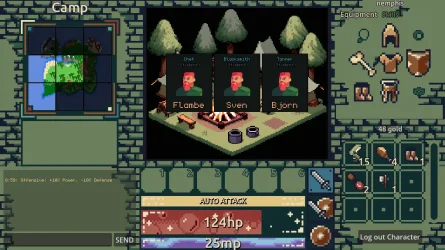
You can buy items that the NPCs have for sale and sell your items if the NPC you're talking to is interested.
Each NPC that sells or buys items has preferences; for instance, they may favor swords or helmets, which increases the value of those categories by a fixed percentage. This means that selling a sword to NPC A will yield more gold than selling the same sword to NPC B.
# Stats
As mentioned in the introduction, the player has stats similar (or identical) to those in Tibia. I even incorporated formulas from TibiaWikia to get started.
Club and shielding stats are not greyed out because that’s the weapon of choice, and a shield is equipped. Sword and axe stats are less relevant when using a club weapon so that's why I made them less visible.
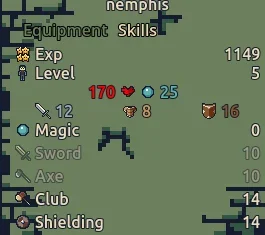
# Map System and Navigation
I’m not completely satisfied with how this turned out, but it does the job. A rework is planned!
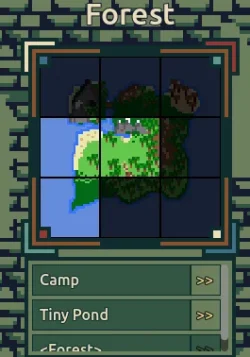
# Hostile Zones.
When you enter a hostile zone, I simulate dice throws and a deck of cards. In the Graveyard, for example, there is one card slot.
In the image below, you can see the following stats for a card slot:
Enemies 1/6
Empty 3/6
Exploration 2/6
What does this mean? The n/6 format indicates a six-sided die, where one side results in encountering a monster, three sides prompt a reroll, and two sides yield exploration cards.
Exploration cards differ by location. In this specific example, you might find holes and doors leading to deeper areas of the Graveyard. If you don’t find any doors or holes, you may discover loot bags that can be opened for extra loot and gold or quest boxes with level or key requirements.
The final option is "dressing," which includes bushes, statues, gravestones, trees, and rocks (depending on the location) to enhance the environment—similar to how Tibia and OT add details to their maps.
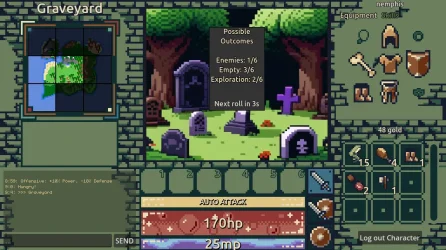
You may encounter a monster, like a Skeleton. When a monster card spawns, the player character will begin auto-attacking. When the monster is defeated, items may drop and will appear just below the monster card. To loot the items, simply click on them.
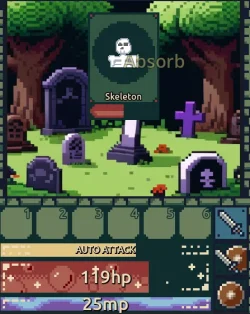
What can I do as a developer to ensure a location is challenging or easy? There are several factors to consider:
As with other developers, monetization must be part of this so I can pay my rent. How this will be achieved? I’m not entirely sure yet, but I’m not a fan of pay-to-win mechanics, so I’ll be exploring other options.
Thank you for reading this thread! If you have any comments, feel free to share. I hope I’ve provided a solid overview of the game and what I’m trying to build.
Embark on a journey to become one of the greats—one of those legendary figures that people talk and sing about. The world isn't ending, but there are enough dangers threatening the lives of ordinary people. Fight monsters, loot items, and grow stronger as you progress. With online features, you can chat with nearby players, view high scores, sell items on the market, form guilds, and raid bosses. Earn your gold, build your fortune, and gain fame in this relaxed semi-idle, semi-online RPG.
Why I Started Developing the Game
As someone who enjoys idle games, I was playing one that was decent but tedious. To progress, you had to level up various skills: mining, logging, blacksmithing, fishing, herbing, alchemy, enchanting, and even building a house that would serve as your bank. Community progress was tied to helping NPCs level up in those professions. You also had to fight and defeat monsters, among other things that I never managed to unlock. I realized I just wanted to kill monsters and loot items.
So, I decided to create my own game. Initially called Aethel Isle, it has since been renamed Knota. Pronounce it however you like.
This is the beginner island. You will first spawn in a camp where you’ll find three NPCs.

You can buy items that the NPCs have for sale and sell your items if the NPC you're talking to is interested.
Each NPC that sells or buys items has preferences; for instance, they may favor swords or helmets, which increases the value of those categories by a fixed percentage. This means that selling a sword to NPC A will yield more gold than selling the same sword to NPC B.
# Stats
As mentioned in the introduction, the player has stats similar (or identical) to those in Tibia. I even incorporated formulas from TibiaWikia to get started.
Club and shielding stats are not greyed out because that’s the weapon of choice, and a shield is equipped. Sword and axe stats are less relevant when using a club weapon so that's why I made them less visible.

# Map System and Navigation
I’m not completely satisfied with how this turned out, but it does the job. A rework is planned!
- Zones: The squares you click on the map.
- Locations: All possible places within a zone that you can travel to and explore.

# Hostile Zones.
When you enter a hostile zone, I simulate dice throws and a deck of cards. In the Graveyard, for example, there is one card slot.
In the image below, you can see the following stats for a card slot:
Enemies 1/6
Empty 3/6
Exploration 2/6
What does this mean? The n/6 format indicates a six-sided die, where one side results in encountering a monster, three sides prompt a reroll, and two sides yield exploration cards.
Exploration cards differ by location. In this specific example, you might find holes and doors leading to deeper areas of the Graveyard. If you don’t find any doors or holes, you may discover loot bags that can be opened for extra loot and gold or quest boxes with level or key requirements.
The final option is "dressing," which includes bushes, statues, gravestones, trees, and rocks (depending on the location) to enhance the environment—similar to how Tibia and OT add details to their maps.

You may encounter a monster, like a Skeleton. When a monster card spawns, the player character will begin auto-attacking. When the monster is defeated, items may drop and will appear just below the monster card. To loot the items, simply click on them.

What can I do as a developer to ensure a location is challenging or easy? There are several factors to consider:
- Determine how many card slots are available.
- Decide the outcome of each card. For instance, a card with 5/6 enemies simulates a heavily populated area, while 1/6 (like the Graveyard) indicates a less populated area.
- Decide how many of each monster are present in that zone. If I place one skeleton and two bats, that gives a 1/3 chance of encountering a skeleton and a 2/3 chance of encountering a bat. Of course, the roll must first land on an enemy side before encountering a monster.
The End
The game started as a mobile project but later transitioned to PC only. Unlike other idle games, you can’t log out in a hostile zone and return later to collect your XP and loot. The only offline aspect will be offline training, similar to Tibia.As with other developers, monetization must be part of this so I can pay my rent. How this will be achieved? I’m not entirely sure yet, but I’m not a fan of pay-to-win mechanics, so I’ll be exploring other options.
Thank you for reading this thread! If you have any comments, feel free to share. I hope I’ve provided a solid overview of the game and what I’m trying to build.
